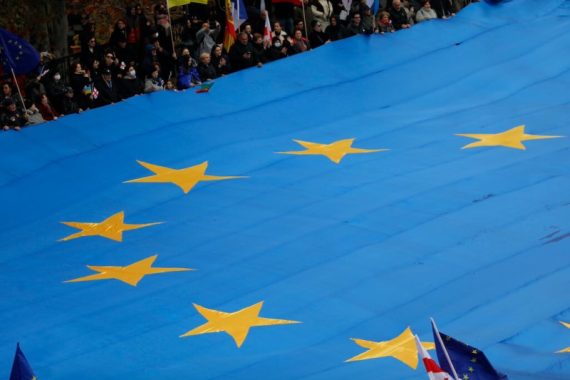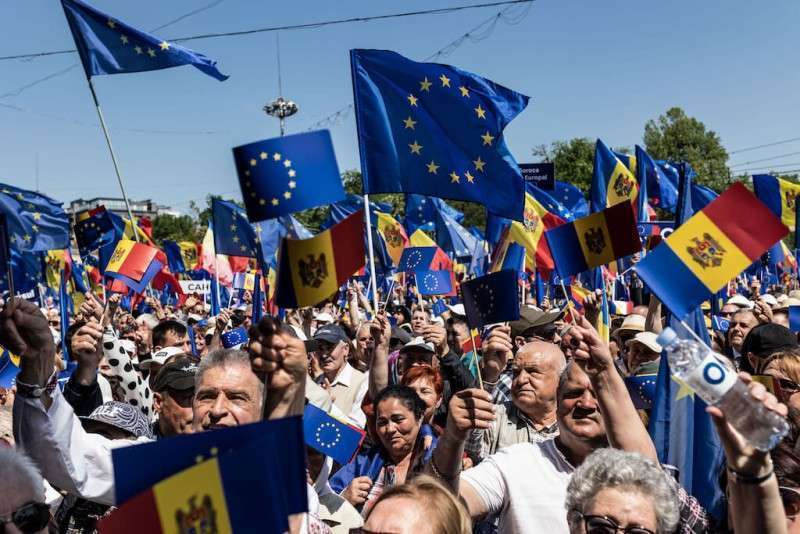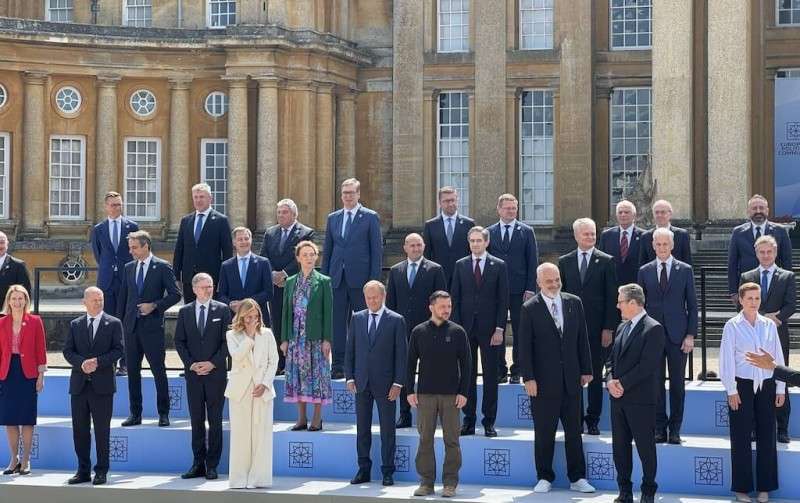The Council of the European Union had decided to open accession negotiations with Ukraine and Moldova in December 2023. On June 25, 2024, the EU held the first meeting of the Intergovernmental Conference at ministerial level to officially open accession negotiations with both Ukraine and Moldova. In many ways, this accession negotiation process was different from others. A brief look at the EU’s previous enlargements is needed to understand this difference.
A Brief History of EU Enlargement
Enlargement policy is the EU’s most important foreign policy instrument. The reason for this is the transformative power of the EU, the power to transform the countries that will become members of the EU by means of conditionality. By spreading its values through enlargement, the EU is able to ensure its stability, security and prosperity. Moreover, by enlarging with new member states, the EU becomes a much stronger Union economically, politically and geopolitically, and increases its effectiveness in the international system.
Since its first enlargement in 1973, the EU has gone through several rounds of enlargement, bringing the number of member states up to 28. Following Brexit and the UK’s withdrawal from the Union, the EU now has 27 Member States. Each enlargement has been assessed in the context of the needs of the time and has taken place when the conditions have been met. For example, the UK, Ireland and Denmark applied to join the European Economic Community (EEC) in 1961, but were rejected twice, first in 1963 and again in 1967, because of French President Charles De Gaulle’s concerns over Britain’s close ties with the United States that would be detrimental to the Union. The first wave of enlargement, which included the UK, did not take place until after De Gaulle’s resignation.
The second wave of enlargement was also dealt with assessing in the context of the needs of the time. The EEC had suspended the Association Agreement with Greece after the Greek junta seized power in 1967 and installed the regime of the colonels. After the military junta had handed over power to civilians and a democratic government had been restored, Greece applied for membership again. After six years of negotiations, the Member States, instead of excluding Greece, arguing that its democratization could be achieved more effectively within the EEC, acted with the idea that we would admit Greece as a member in 1981 and democratize it.
Under the regime of General Francisco Franco, Spain’s application to join the EEC in 1962 was rejected. Following political reforms and democratic elections, Spain submitted its formal application in 1977, which led to the EEC’s decision to open accession negotiations in 1978. Similarly, after the resignation of Antonio de Oliveira Salazar in 1968 and the replacement of the regime established by the military coup of 1974 with a democratic regime following the 1975 elections, Portugal formally applied to the EEC in 1977 and began negotiations in 1978. The 1981 enlargement to include Greece and the 1986 southern enlargement to include Spain and Portugal changed the EU from a “club of democracies” into a “school of democracy”.
In addition to political issues, obstacles to Iberian enlargement included the fact that these two countries produced similar agricultural products to France. In addition, the fact that Spain and Portugal, which had been ruled by dictatorships for many years, were economically lagging the other members caused concern among other EEC member states because of the possible influx of workers from these two countries.
The accession process of Spain and Portugal was realized after overcoming concerns that they would be an economic burden on the member states in terms of agriculture and free movement of labor if they joined the EEC. Of course, the geopolitical importance of these two countries, in particular the benefits that their close links with both the Mediterranean and Latin America would bring to the EEC in these regions, and the success of the previous enlargement policy were taken into account by the EEC countries, and the negative view of the accession process of these two countries changed and they became members in 1986.
The fourth wave of enlargement (the Scandinavian enlargement) became possible by the end of the Cold War. Austria, Finland and Sweden, which had maintained a policy of neutrality during the Cold War, joined the EU in 1995. The fact that these countries had already have European standards, both politically and economically, facilitated their accession process.
The fifth wave of enlargement took place with the end of the Cold War and the accession of Central and Eastern European countries to the EU in 2004 and 2007. The collapse of communism, the disintegration of the Soviet Union and the adoption of the Sinatra Doctrine by the Russian Federation facilitated the process leading to their EU membership.
Estonia, Latvia, Lithuania, Poland, the Czech Republic, Slovakia, Slovenia, Malta, the Greek Administration of Southern Cyprus (GASC) and Hungary joined the EU in 2004. The EU membership of these countries became possible when they fulfilled the Copenhagen criteria and became EU-like countries and contributed to EU security and stability.
Although Bulgaria and Romania failed to meet the EU’s criteria on corruption and an impartial judiciary, they were granted membership in 2007, albeit belatedly. Rather than leaving Bulgaria and Romania outside the EU, as was the case with Greece, they were helped to continue their transformation and development within the EU.
The most recent enlargement of the EU was the accession of Croatia. Croatia, which gained independence after the break-up of Yugoslavia, was able to join the EU after resolving its border issue with Slovenia. The growing strategic importance of the Balkans for the EU paved the way for Croatia’s accession process and the prospect of future Balkan enlargement.
For Turkey, which started accession negotiations to the EU at the same year with Croatia in 2005, the EU negotiation process was de facto frozen. When Balkan enlargement on the agenda and accession negotiations officially opened with Ukraine and Moldova, the question arises as to what will happen to the accession negotiations with Turkey. Although Turkey has recently expressed its willingness to take steps to revive its EU membership process it has not been included in these new enlargement perspectives of the EU.
Ukraine and Moldova’s EU Accession Process
We are witnessing that the EU, long suffering from enlargement fatigue, has begun taking important steps in the enlargement process. In a changing world and in the new European security environment, the EU has put aside its longstanding anti-enlargement approach. The war in Ukraine and its aftermath, as well as the changing conjuncture, have given a new impetus to EU enlargement, with both Ukraine and Moldova and the Western Balkans on the EU agenda.
European Commission President Ursula von der Leyen signaled this change in her State of the Union speech on 13 September. In her speech, von der Leyen said that a new group of states, including the Western Balkans, would be admitted as new member states of the EU. The date for this enlargement scheduled to 2030. On 7 May 2024, the EU member states took a decision to support the Western Balkan countries with 6 billion euros, 4 billion euros in loans and 2 billion euros in grants to make them economically ready to join the Union. The fulfillment of this support based on two conditions: achieving political reforms and foreign and security policy alignment with the EU against Russia.
Ukraine and Moldova, previously part of the European Neighborhood Policy (ENP) and the Eastern Partnership (EaP), began to be considered in new enlargement policy. The relationship between Ukraine and the EU evolved into a different process with the Association Agreement, negotiated between 2007 and 2011 and signed in 2014, including the Deep and Comprehensive Free Trade Area (DCFTA).
Recommended
The pro-Russian president Viktor Yanukovych’s reluctance to sign the DCFTA led to pro-EU protests in November 2013, the so-called Euromaidan uprisings, and Yanukovych’s removal from power, and Russia’s annexation of Crimea in 2014. Russia’s invasion of Ukraine on 24 February 2022, which is called as “special military operation” by Russian government, became the factor that accelerated Ukraine’s accession process. On 28 February 2024, 4 days after Russia’s invasion of Ukraine, Ukraine applied for EU membership and on 23 June Ukraine was granted candidate status by the EU.
Although relations between Moldova and the EU began in 1994, when Moldova signed the Partnership and Cooperation Agreement with the EU, the main obstacle to Moldova’s membership in the EaP under the ENP was the fact that the country’s economy did not meet EU standards and, most importantly, the situation in the Russian-backed Transnistria region.
Moldova, like Ukraine, applied for EU membership on 3 March following Russia’s invasion of Ukraine. Together with Ukraine, it was granted candidate status on 23 June 2022. Ukraine is currently at war with Russia, while Moldova is concerned about a possible war situation due to Russia’s support for the Transnistria region.
The start of negotiations with Ukraine on 25 June was only possible after convincing Hungary, which was opposed both because of the war in Ukraine and because of the treatment of the Hungarian minority in Ukraine. Negotiations with Ukraine and Moldova were officially launched before Hungary took over the rotating EU presidency on 1 July, thus avoiding a potential stumbling block. But there are many other features of this wave of enlargement that make it different from the others.

VIDEO: Ukraine starts EU membership talks in midst of war
Perhaps the most important of these is that this is the first time the EU has officially opened accession negotiations with a country at war. Of course, there is also the fact that the process was officially launched very soon after these two countries applied for membership. Compared to previous enlargement processes, the fact that negotiations for Ukraine and Moldova were officially launched just two years after their applications shows that this enlargement process is a particularly accelerated membership process.
Compared to Turkey’s EU accession process, there are some important differences. The “principle of good neighborhood” was imposed on Turkey as a condition for EU membership with Agenda 2000 that was introduced in 1997. Accordingly, Turkey should resolve its border problems with other countries. At the summit of EU leaders on 17-18 April, the High Representative and the Commission, taking into account the “Joint Communiqué on the state of political, economic and commercial relations between the EU and Turkey”, reiterated this principle as a condition for the resolution of the conflict in the Eastern Mediterranean and the resumption and progress of the Cyprus settlement negotiations. It seems that the enlargement process and conditions work differently for Ukraine, which is at war with Russia, and Moldova, which has a territorial dispute over the Russian-backed separatist region of Transnistria.
With the exception of Croatia’s accession, the EU did not have a mutual defense clause (Article 42(7) TEU) at the time of previous enlargements. The EU’s mutual defense clause 42.7 was adopted by the Lisbon Treaty in 2009 as an article similar to NATO’s collective defense article 5. It states that “if a Member State is the victim of an armed attack on its territory, the other Member States shall be under an obligation, in accordance with Article 51 of the Charter of the United Nations, to render it assistance and support by all means at their disposal. This is without prejudice to the specific nature of the security and defense policies of some Member States. Commitments and cooperation in this field will be consistent with commitments under the North Atlantic Treaty Organization, which remains the basis of collective defense for its Member States and the forum for its implementation” (Lisbon Treaty – Mutual Defence Clause 42/7).
Therefore, the membership of Ukraine, which is at war with Russia, means risking a possible war with Russia. EU Council President Charles Michel’s assessment of Ukraine’s and Moldova’s membership as only the beginning of a long process should perhaps be read from this perspective.
The enlargement of the EU, which has been redesigned in a changing world, is again gaining momentum when the EU officially started the negotiation process with Ukraine and Moldova. Throughout the history of the EU, we have seen that each enlargement process has been carried out by evaluating each enlargement in the conjuncture of its own time. This has not changed in the aftermath of the war in Ukraine.
The EU, in its previous waves of enlargement, had contributed to its own stability and security by expanding its geographical sphere of influence and transforming the structures of candidate states to EU’s political and economic standards. The question is whether the EU’s next enlargements to the Western Balkans, Ukraine and Moldova will contribute to the EU in the same way that previous enlargements have contributed to lasting peace in Europe.







